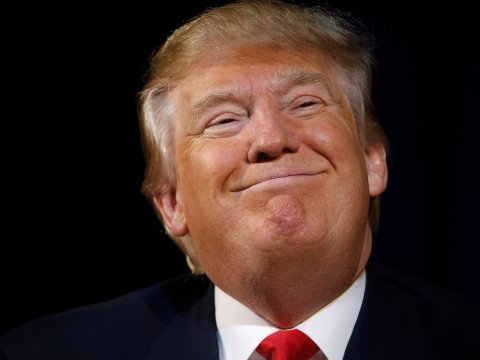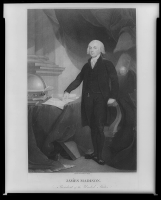Posted on May 16,
2017
Law, Not Orders
Trump edicts mean next to nothing
by
Daniel
Clark
Two weeks ago, President Trump signed an executive
order to repeal the prohibition against politicking in churches, although it
really doesn’t do that. The same order
does, however, overturn the contraception mandate from Obamacare, except that
it can’t. Still, by signing the order,
he showed that he means business, sort of.
The policy of revoking churches’ tax-exempt status if
they become directly involved in political campaigning comes from the Johnson
Amendment, which then-House speaker Lyndon Johnson had added to a bill in order
to protect his own reelection prospects.
In other words, it is part of a law, and thus cannot be undone by a mere
executive order. Neither can the
contraception mandate, the power over which Obamacare assigned to the secretary
of Health and Human Services.
 Trump
has just as meaningfully threatened an executive order to withdraw the United
States from NAFTA, a threat his supporters say will force Canada and Mexico
back to the table. Mind you, during the
campaign, he had already morphed his promise to “rip up” the trade agreement
into a wish to renegotiate it, with which both Canadian prime minister Justin
Trudeau and Mexican president Enrique Pena Nieto agreed. If such a renegotiation takes place, it will
be because each of the three heads of state imagines he is going to hoodwink
the other two, not because Mexico and Canada fear Trump’s order.
Trump
has just as meaningfully threatened an executive order to withdraw the United
States from NAFTA, a threat his supporters say will force Canada and Mexico
back to the table. Mind you, during the
campaign, he had already morphed his promise to “rip up” the trade agreement
into a wish to renegotiate it, with which both Canadian prime minister Justin
Trudeau and Mexican president Enrique Pena Nieto agreed. If such a renegotiation takes place, it will
be because each of the three heads of state imagines he is going to hoodwink
the other two, not because Mexico and Canada fear Trump’s order.
Those media experts who claim that Trump can
unilaterally scrap this “treaty” only serve to illustrate how woeful our civics
education has become over decades of deliberate neglect. NAFTA, being an economic compact, is not
really a treaty. Had it been, it would
only have required approval by the Senate.
Instead, it had to be passed as regular legislation through both houses
of Congress, before being signed into law by President Clinton in 1993. The unanswered academic question of whether a
president has the power to unilaterally end a treaty is irrelevant to this
case.
Article 2205 of NAFTA says, “A Party may withdraw from
this Agreement six months after it provides written notice of withdrawal to the
other Parties.” So, all the president
has to do is draft a statement saying we quit, scrawl his Donald J. Hancock on
the bottom, and it’s done, right? Not so
fast. The “parties” in this agreement
are the three nations, not their individual political leaders, and the manner
in which the United States would have to withdraw from such an agreement is
spelled out very clearly in the Constitution.
 Article
I Section 8 empowers Congress, not the president, to regulate commerce with
foreign nations. NAFTA is just such a
regulation, which is why it had to take the form of legislation in the first
place. A repeal of NAFTA would also
require passage through both houses of Congress, and the governments of Canada
and Mexico probably understand this better than our own lazy-minded media do.
Article
I Section 8 empowers Congress, not the president, to regulate commerce with
foreign nations. NAFTA is just such a
regulation, which is why it had to take the form of legislation in the first
place. A repeal of NAFTA would also
require passage through both houses of Congress, and the governments of Canada
and Mexico probably understand this better than our own lazy-minded media do.
At least when Trump signed his executive order for
completion of the border “wall,” that action was supported by a piece of
legislation, namely the Secure Fence Act of 2006. What he could not order, however, was that
the project be funded.
Executive orders were never meant to serve as a
short-cut through the legislative process.
Either President Trump fails to grasp this, or else he is simply using
his orders so that he will appear to have accomplished things he really has no
interest in doing. When it came time to
demand funds for the “wall” during budget negotiations, he declined. He could discard the contraception mandate by
having his own HHS Secretary revoke the Obama administration rule, but he
hasn’t. If he wanted to repeal the
Johnson Amendment, he could try to encourage congressional Republicans to do exactly
that.
Ironically, one thing Trump could get done through an
executive order is his oft-repeated promise to repeal President Obama’s
executive amnesty for so-called “Dreamers.”
Not only was this not his first act upon taking office, as he had pledged,
but he is now disinclined to do it altogether.
Merely pretending to get things done has been enough
to earn him praise from highly-rated cheerleaders like Sean Hannity, who can be
counted on to celebrate these inert orders with unquestioning fervor, accompanied
by the requisite caption, “Trump: Promises Kept.” If maintaining that illusion is what’s
important to Trump, then fighting for legislation to actually keep these
promises would seem redundant. He might
as well bother actually producing those Trump Steaks that he pretends are still
on the market.
The Shinbone: The
Frontier of the Free Press